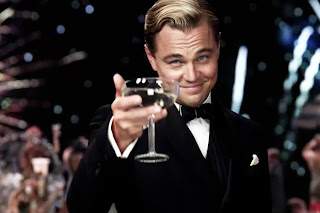The Great Gatsby
**½ out of ****
Directed by: Baz
Luhrmann
Starring: Leonardo
DiCaprio, Carey Mulligan, Tobey Maguire, Joel Edgerton and Isla Fisher
Running time: 142
minutes
Few directors are
more attuned to the intoxicating decadence that F. Scott Fitzgerald chronicled
in his 1925 classic novel than Baz Luhrmann, the shimmering pop stylist behind Moulin Rouge! and Romeo + Juliet.
The director’s decidedly
‘Nouveau Riche’ interpretation – presented in glittery Technicolor with a CGI
palette and 3D – is flashy and often fresh. However, the more Luhrmann and co-screenwriter Craig Pearce insist on ramming the novel’s symbolism down the
audience’s throat, the less this Gatsby
can shake free of its literary shackles.
For those who didn’t
read Gatsby in high school (or
perused the Cliff’s Notes), here’s a plot summary: cautious stockbroker and
narrator Nick Carraway (Tobey Maguire) arrives in New York City during the
early 1920s, drawn by champagne, dollars and all that jazz. He takes up
residence next to a mansion that looks more like a casino, which is owned by the
mysterious Jay Gatsby (Leonardo DiCaprio, sleekly combed).
Gatsby throws
decadent parties that bring in the city’s richest heiresses and businessmen as
they misbehave, embracing the chemical madness of the Roaring Twenties. He
draws in the crowds but seldom makes an appearance. The parties are a ploy to
ignite the interest of Gatsby’s old flame, Daisy (Carey Mulligan), who lives in
a mansion across the river. The lonely millionaire stands on the edge of his
dock every night, looking out at the green light that blares from Daisy’s manor.
The hyperactive editing
that overwhelmed Moulin Rouge! is
scaled back here, although Luhrmann’s penchant for ostentatious CGI backgrounds
and glittery set design has not waned. He brings to the big screen “the
inexhaustible variety of life” that Fitzgerald wrote about. (The lavish set
design comes from Ian Gracie and Beverley Dunn, and costumes from past
collaborator Catherine Martin.)
Also in heavy supply,
as usual for a Luhrmann production, are the anachronisms. The same director who
updated Shakespeare to South Central Los Angeles and brought Nirvana and
Madonna to 19th-century France brings tunes by Lana Del Ray, U2 and
Jay-Z (who served as an executive producer) and mixes them with the flair of
Gershwin and Cole Porter.
Nearly a century’s
separation in music does not, surprisingly, clash. The songs of lovelorn grief
and racial struggle that trumpet through the Jazz Age boast the same energy and
style. When Luhrmann plays a Jay-Z tune over a black musician performing on a New York
balcony, he is connecting nearly 100 years of African American music. The results
are illuminating more than distracting.
And speaking of Jay-Z, this Gatsby has
quite a few problems – and Scott Fitz is one. Luhrmann restricts his visual
freedom by keeping with Fitzgerald’s prose, insisting on having the
words from his text flutter onscreen, even though they are just as intoxicating
as his visual schematic.
Luhrmann also makes the
strange decision to structure the story with Carraway stationed at a
psychiatric ward in the aftermath of the 1929 market crash, driven to write
about Gatsby to save him from the drink and his own great depression.
Instead of keeping the story flowing, Luhrmann cuts back intermittently to a
catatonic Carraway typing away, a monotone voice-over interrupting the
illustrious presentation.
Meanwhile, the actors
fare well in their roles. Maguire may be ten years too old to play Carraway,
but DiCaprio hits his mark memorably as the cool, confident, charismatic title
character, arresting to look at but also showing an aching vulnerability in his
unsteady romantic come-ons to Daisy.
The scenes between
DiCaprio and Maguire have more chemistry than our leading man’s moments with
Mulligan, though. Also impressive is Joel Edgerton (Warrior) as Daisy’s brutish
husband, Tom Buchanan. As a man who loves his wife but carries on with a flurry
of affairs and deceit, Edgerton manicures both of these angles to deliver some
powerful, soul-searching moments in the last third.
This adaptation is as
crisp and flashy as a $100 bill and as bright as a marquee, although the film
misses the opportunity to, beyond the musical motifs, comment on the
similarities between the glamour of 1920s America and the 2000s, especially
considering the financial woes that later struck citizens in both decades.
The film looks
amazing but is sometimes aimless, superbly acted if stiffly paced (unlike the
original text). Even when the running time begins to strain, Luhrmann’s Great
Gatsby captures the grandness of the freewheeling American zeitgeist in the
1920s. He keeps the novel’s enduring legacy alive, even though topping off the
film with narration lifted right from the book becomes redundant.






No comments:
Post a Comment